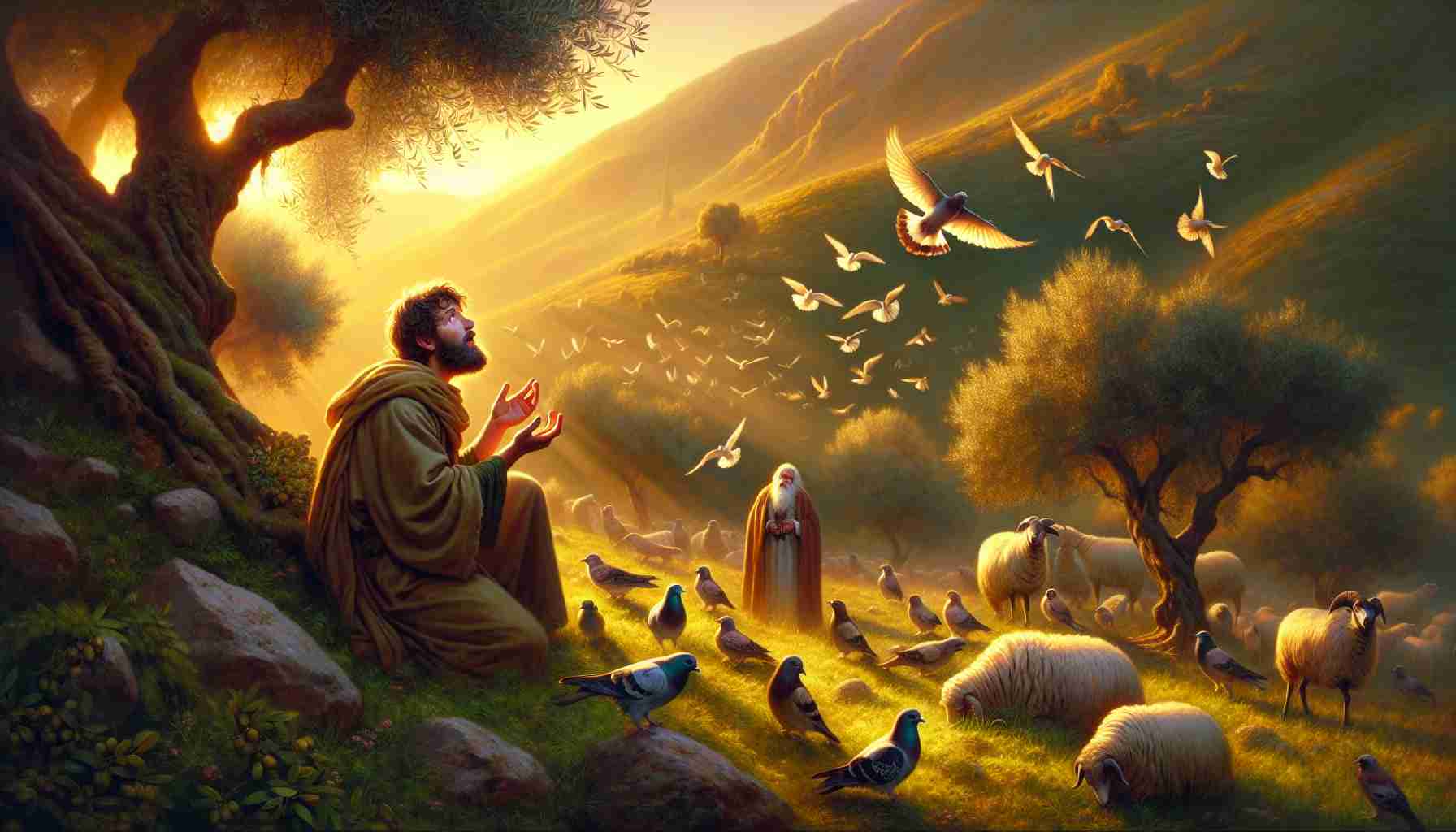

I still remember the first morning I heard it—clear, melodic, full of something I couldn’t name. At first, I thought it was the wind. But no, it was too steady. Then I saw them: birds. Hundreds of them. Sparrows, doves, even great hawks of the sky, circling above the valley in slow patterns. And in the middle of it all stood Dawud—Prophet David, peace be upon him.
You won’t find my name in any surah. I was just a shepherd boy then, watching over my family's goats near the hills of Jerusalem. My father had told me once about Dawud’s voice, how Allah had given him a special gift. “He sings the praises of Allah,” Father said. “And when he does, even the mountains and birds join him.”
I hadn’t believed it—until that morning.
Dawud's voice was not like any singing I had ever heard. It wasn’t loud like a trumpet or gentle like a flute. It was... alive. Every word he said in praise of Allah—every line of the Zabur, the holy book Allah gave him—sounded like it had purpose. Like the earth itself was listening.
That morning, I stood frozen on the hill, my goats beginning to wander. I couldn’t move my feet. The air seemed to hum. And the birds—they weren’t just flying nearby. They circled in harmony, echoing his tones, as if answering him in a language I didn’t understand but could somehow feel.
It wasn’t just beauty. It was truth.
Later that day, I returned home and told my father. He nodded slowly. “You’re old enough now,” he said. “Let me tell you what Allah says in the Qur'an: 'We made the mountains and the birds join Dawud in Our praise' (Surah Sad 38:19). What you saw was real. When a heart is sincere, creation itself joins in praising the Creator.”
I couldn’t stop thinking about it. If even birds and mountains submitted to Allah’s words, what about me? What stopped me from using my own voice for good? From thanking Allah every day the way Dawud did?
I began to recite the simplest of praises as I watched my flock: “SubhanAllah — Glory be to Allah.” It seemed small. But I remembered Dawud started as a shepherd too. And it was his gratitude, his fairness, and his patience that made Allah choose him as a prophet and king. People say he used to judge between people with justice, always turning back to Allah when he feared a mistake.
From that day, I tried to use my voice more carefully. Not to argue or complain like I used to, but to praise, to thank, to apologize when I was wrong. It felt like the birds still circled up there, reminding me.
Maybe I can’t sing like Dawud. But I can still be part of the harmony.
— Inspired by Surah Sad 38:17–26 and classical tafsir (commentaries) such as those of Ibn Kathir —
I still remember the first morning I heard it—clear, melodic, full of something I couldn’t name. At first, I thought it was the wind. But no, it was too steady. Then I saw them: birds. Hundreds of them. Sparrows, doves, even great hawks of the sky, circling above the valley in slow patterns. And in the middle of it all stood Dawud—Prophet David, peace be upon him.
You won’t find my name in any surah. I was just a shepherd boy then, watching over my family's goats near the hills of Jerusalem. My father had told me once about Dawud’s voice, how Allah had given him a special gift. “He sings the praises of Allah,” Father said. “And when he does, even the mountains and birds join him.”
I hadn’t believed it—until that morning.
Dawud's voice was not like any singing I had ever heard. It wasn’t loud like a trumpet or gentle like a flute. It was... alive. Every word he said in praise of Allah—every line of the Zabur, the holy book Allah gave him—sounded like it had purpose. Like the earth itself was listening.
That morning, I stood frozen on the hill, my goats beginning to wander. I couldn’t move my feet. The air seemed to hum. And the birds—they weren’t just flying nearby. They circled in harmony, echoing his tones, as if answering him in a language I didn’t understand but could somehow feel.
It wasn’t just beauty. It was truth.
Later that day, I returned home and told my father. He nodded slowly. “You’re old enough now,” he said. “Let me tell you what Allah says in the Qur'an: 'We made the mountains and the birds join Dawud in Our praise' (Surah Sad 38:19). What you saw was real. When a heart is sincere, creation itself joins in praising the Creator.”
I couldn’t stop thinking about it. If even birds and mountains submitted to Allah’s words, what about me? What stopped me from using my own voice for good? From thanking Allah every day the way Dawud did?
I began to recite the simplest of praises as I watched my flock: “SubhanAllah — Glory be to Allah.” It seemed small. But I remembered Dawud started as a shepherd too. And it was his gratitude, his fairness, and his patience that made Allah choose him as a prophet and king. People say he used to judge between people with justice, always turning back to Allah when he feared a mistake.
From that day, I tried to use my voice more carefully. Not to argue or complain like I used to, but to praise, to thank, to apologize when I was wrong. It felt like the birds still circled up there, reminding me.
Maybe I can’t sing like Dawud. But I can still be part of the harmony.
— Inspired by Surah Sad 38:17–26 and classical tafsir (commentaries) such as those of Ibn Kathir —